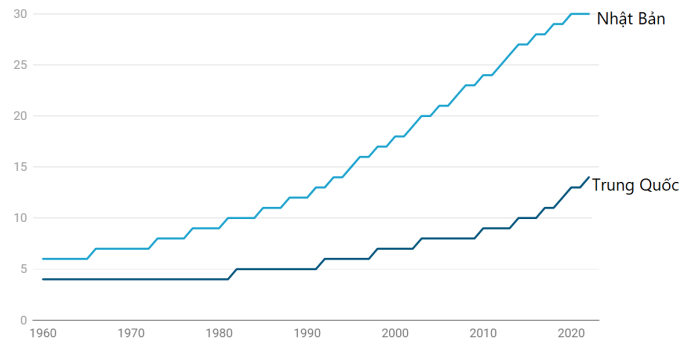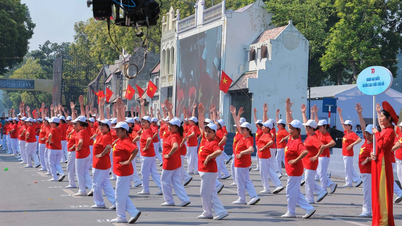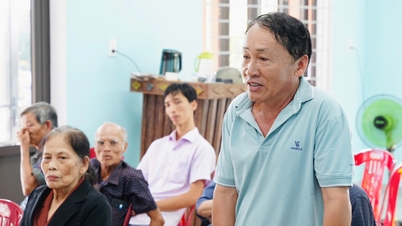China has yet to enter the group of high-income countries while facing the challenge of an aging population and a younger generation delaying childbearing due to economic pressure.
Cici, 27, doesn’t want to have children until she’s at least 35. Her mother is pressuring her to get married and “settle down,” but between working at a tech company in Beijing and studying for a master’s degree in law, Cici has little time to think about starting a family.
Cici’s story is not uncommon. Around the world , young women are delaying marriage and childbearing longer than their mothers and grandmothers. But the phenomenon is so severe in China that last year, the population fell by 850,000, the first time China has seen a population decline in more than 50 years, as the birth rate fell to an all-time low.
China’s shrinking population signals serious problems for the economy. Cici’s plight is common among millennials in many wealthy countries, but China is not yet in that category. The World Bank defines a high-income country as one with a GDP per capita above $13,845. China’s per capita income has skyrocketed in the 21st century but will only reach $12,850 in 2022. Many economists fear China will “get old before it gets rich.”

Chinese people at a book fair in Beijing on September 18. Photo: AFP
Comparisons are being made between China and Japan, two countries that entered a period of economic doldrums in the early 1990s. Japan's "lost decade" of deflation and prolonged low growth was fueled by a stock market crash, but the situation was exacerbated by an aging population.
About 14% of China’s population is now over 65, a threshold Japan passed in 1993. But it took Japan nearly 10 years to go from 10% to 14%, and China just 6 years. Over the next 20 years, China is on track to add more people over 65 than the entire population of the United States.
The Chinese government is well aware of this problem. In 2016, China abolished its decades-long one-child policy, replacing it with a three-child limit. Some provinces have completely abolished family size restrictions in an effort to encourage women to have children. Other policies have included 30 days of paid leave for newlyweds, discounts on artificial insemination costs, and cash subsidies for families having second and third children.
But these policies have not made much difference. Younger generations like Cici today are more educated than their parents and are less willing to adhere to traditional norms of family planning.
Cici said she wanted to stabilize her career before starting a family. She and her boyfriend had saved 2 million yuan ($270,000) to buy a house in Beijing, where the average price per square meter was 70,740 yuan ($9,500) in July.
As long as young people like Cici feel their savings aren’t growing enough to support having children, China’s workforce will continue to shrink. Between 2019 and 2022, the number of working-age people will fall by more than 40 million, making it harder to support the elderly.

Percentage of population over 65 years old in Japan and China over the years. Graphic: Guardian
In 2019, the Chinese Academy of Social Sciences warned that the state pension fund could run out by 2035. The warning came before the economic slowdown of the past few years hit pension contributions. During the Covid-19 pandemic, the Chinese government allowed companies to suspend social security contributions for up to six months, saving companies 1.54 trillion yuan but also reducing pension fund revenues by 13%, pushing the system into deficit for the first time.
Zoe Zongyuan Liu, a fellow at the Council on Foreign Relations, a US-based think tank, said the pension deficit could be a short-term problem, "but because the population is shrinking, it will be difficult to increase the base pension. Therefore, investment must be increased."
"The Chinese government has been developing many programs that allow pension funds to be invested in various assets to increase profits, but whether they can increase or not depends on the economy," he said.
"If the economy is not good, if investments are not effective and the government continues to cut its contribution rate, the deficit will be more serious," Liu said.
China has one of the lowest retirement ages in the world. Men can retire at 60, while women can retire at 55 or 50. Proposals to raise the retirement age have always generated strong public backlash. This year, state media reported that Beijing was pushing ahead with plans to raise the retirement age, but did not specify a timeframe.
Hong Hanh (According to Guardian )
Source link



![[Photo] President of the Cuban National Assembly visits President Ho Chi Minh's Mausoleum](https://vphoto.vietnam.vn/thumb/1200x675/vietnam/resource/IMAGE/2025/10/1/39f1142310fc4dae9e3de4fcc9ac2ed0)
![[Photo] Keep your warehouse safe in all situations](https://vphoto.vietnam.vn/thumb/1200x675/vietnam/resource/IMAGE/2025/10/1/3eb4eceafe68497989865e7faa4e4d0e)


![[Photo] Hanoi morning of October 1: Prolonged flooding, people wade to work](https://vphoto.vietnam.vn/thumb/1200x675/vietnam/resource/IMAGE/2025/10/1/189be28938e3493fa26b2938efa2059e)

























































































Comment (0)